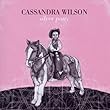 By Daniel Garrett
By Daniel Garrett
Cassandra Wilson, Silver Pony
Produced by Cassandra Wilson and John Fischbach
Ojah Media Group/Blue Note Records, 2010
The piano is both partner and embellishment for Cassandra Wilson’s unique voice in “Lover Come Back to Me,” supported by percussion that is both light and intense; and that in the kind of sexy love song that has been so long established that it is in danger of losing its potency—except Wilson’s phrasing makes it a fresh experience. Standards can be hard to sing—they help a singer with their excellent craft (much of the persuasion is already in the song), but classic songs require mastery to prevent the singer from being dwarfed by the song and to enable a singular meaning. Standards challenge the singer to match or surpass those who have come before (and Streisand’s version of “Lover Come Back to Me,” both frantic and erotic, is in my head), but Cassandra Wilson reflects on the lyrics as she sings—registering relish and regret—and improvises a bit of wordless wildness toward the end of “Lover Come to Back to Me,” making it hers. It is a good beginning for her album Silver Pony, which collects live and studio performances of old and new songs, some of which she has helped to write.
I think that the first time I heard “St. James Infirmary,” a song about going to view the dead, pale body of a lover, it was done by Lou Rawls and inspired chills, and here Cassandra Wilson does her own version, “Went Down to St. James Infirmary,” an uptempo interpretation with a bass and piano that reanimates the song. It is followed by the instrumental “A Night in Seville,” and Wilson’s whispery—seductive, soothing—singing in “Beneath a Silver Moon,” in which she invites her listener to “come dance with me beneath a silver moon.”
I still find Cassandra Wilson absolutely fascinating. Her singing is thoughtful and relaxed, musical and dry, and her repertoire is entertaining, important, intelligent, and wide-ranging. I think that I first began to listen to her in the late 1980s—her albums Jumpworld and She Who Weeps were early favorites; and I later saw her live several times, including in Central Park and at the Bottom Line in Manhattan. The collections Blue Light ‘Til Dawn and New Moon Daughter gave her a broader audience, but there remains something idiosyncratic about her: it may be true that all genuine artists are eccentrics, whether they are mainstream or marginal. I like very much her Traveling Miles collection, a tribute to Miles Davis, and am always curious about what she is doing—and Silver Pony gratifies my interest. The Mississippi-born Wilson, who has lived in New York and been residing recently in New Orleans, has chosen for her Silver Pony collaborators and comrades electric guitarist Marvin Sewell, bassist Reginald Veal, drummer Herlin Riley, pianist Jonathan Batiste, percussionist Lekan Babalola, saxophonist Ravi Coltrane, cellist Helen Gillet, singer-songwriter John Legend, rhythm guitarist Luke Laird, and acoustic guitarist Brandon Ross.
Cassandra Wilson introduces “Saddle Up My Pony” by calling its writer—Charlie Patton—a master, and she allows a twanging guitar to conjure another state of mind, another world, before her warm, expansive voice enters. Her tonal control is impressive. The words are not profound (“I don’t want to marry—no, I just you to be my man”), but what she does is. One hears the wilderness of the country in her voice as well as her own cultivated mind. Wilson sings Stevie Wonder’s “If It’s Magic” and it is sadder than his version, though as inevitably wistful. (Is romance merely a balm that soothes the real wounds of love and life? Or do its illusions cause the wounds?) “Forty Days and Forty Nights” is the follow-up to a breakup, and the song, previously performed by Muddy Waters, is a revised edition in the history of the blues; and then there is a short instrumental, “Silver Pony.”
“A Day in the Life of a Fool” has melancholy lyrics but a light sound, a nice contrast. Lennon and McCartney’s “Blackbird” is given a bluesy aspect, and the wonder and sympathy in Wilson’s voice is attractive. The album closes with a love duet featuring John (Stephens) Legend; and there is a natural correspondence between their voices, though he is more of a belter and does not have the edgy character she has. Yet, John Legend (Get Lifted, Wake Up), who has collaborated with Al Green and Angelique Kidjo, and lately resurrected a bunch of songs with social meaning, is growing as an artist, claiming some special ground: he is proof that our significance grows—or diminishes—with our choices. Cassandra Wilson proved that long ago.
Daniel Garrett, a graduate of the New School for Social Research, and the principal organizer of the Cultural Politics Discussion Group at Poets House, is a writer whose work has appeared in The African, All About Jazz, American Book Review, Art & Antiques, The Audubon Activist, Black Film Review, Changing Men, Cinetext, Contact II, Film International, The Humanist, Hyphen, Illuminations, Muse Apprentice Guild, Offscreen, Option, Pop Matters, Quarterly Black Review of Books, Rain Taxi, Red River Review, Review of Contemporary Fiction, Wax Poetics, and World Literature Today. Garrett originated two internet logs: one focused on culture and social issues, “City and Country, Boy and Man,” and one focused on books, “The Garrett Reader.” He has been writing a novel, A Stranger on Earth.